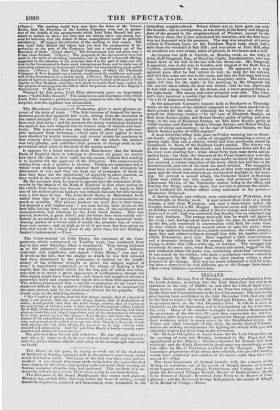The Manchester Guardian of Wednesday gives a more gloomy ac-
count of the state of trade. "The little increase of demand for manu- factured goods that appeared last week, arising from the execution of the orders brought by the steamer from the United States, appears to have now died away ; and the pressure for money continuing unabated, the market has now relapsed into its former state of dulness and inac- tivity. The yarn-market was also injuriously affected by unfavour- able accounts from Germany ; where sales of yarn appear to have been checked by hostile rumours, and several orders for purchases in this country have been countermanded. On the whole, the market was very gloomy, and exhibited little promise of change until an im- provement takes place in the state of the money-market.'
It appears by a letter received from Manchester, that the branch Bank of England there is refusing to discount all paper, no matter how short the date or how valid are the names, without first sending it to London for the approval of the Directors. The inconvenience arising from such a practice is obvious. Parties are sometimes left a whole week without knowing whether their bills will ultimately be discounted or not ; and they are kept out of possession of them, so that they have not the opportunity of applying to other quarters, as they would in the event of an immediate refusal.— Times, Nov. 5. By the accounts from Liverpool it appears that the restriction of dis- counts by the branch of the Bank of England in that place, acting on the orders from home, has become extremely rigid ; so much so, that one of the richest private bankers was refused discount for bills having only a few days to run. The Joint Stock Banks in Manchester have raised their rate to 6 per cent., and are curtailing accommodation as much as possible. The private bankers are more free in their loans, but demand a still higher rate; 7 per cent. having been given on the best bills, having three and four months to run, of the merchants and manufacturers, and indorsed by the Joint Stock Banks. This has proved, however, a great relief; and the terms have been readily sub- mitted to, so essential is a supply at this time for the autumnal trade. Among parties of a lower class of credit, the pressure has, of course, been very severe ; and as high as 10 or 12 per cent. has been given on bills that would be termed good at any other time, but not bearing a banker's indorsement.—Times.


























 Previous page
Previous page